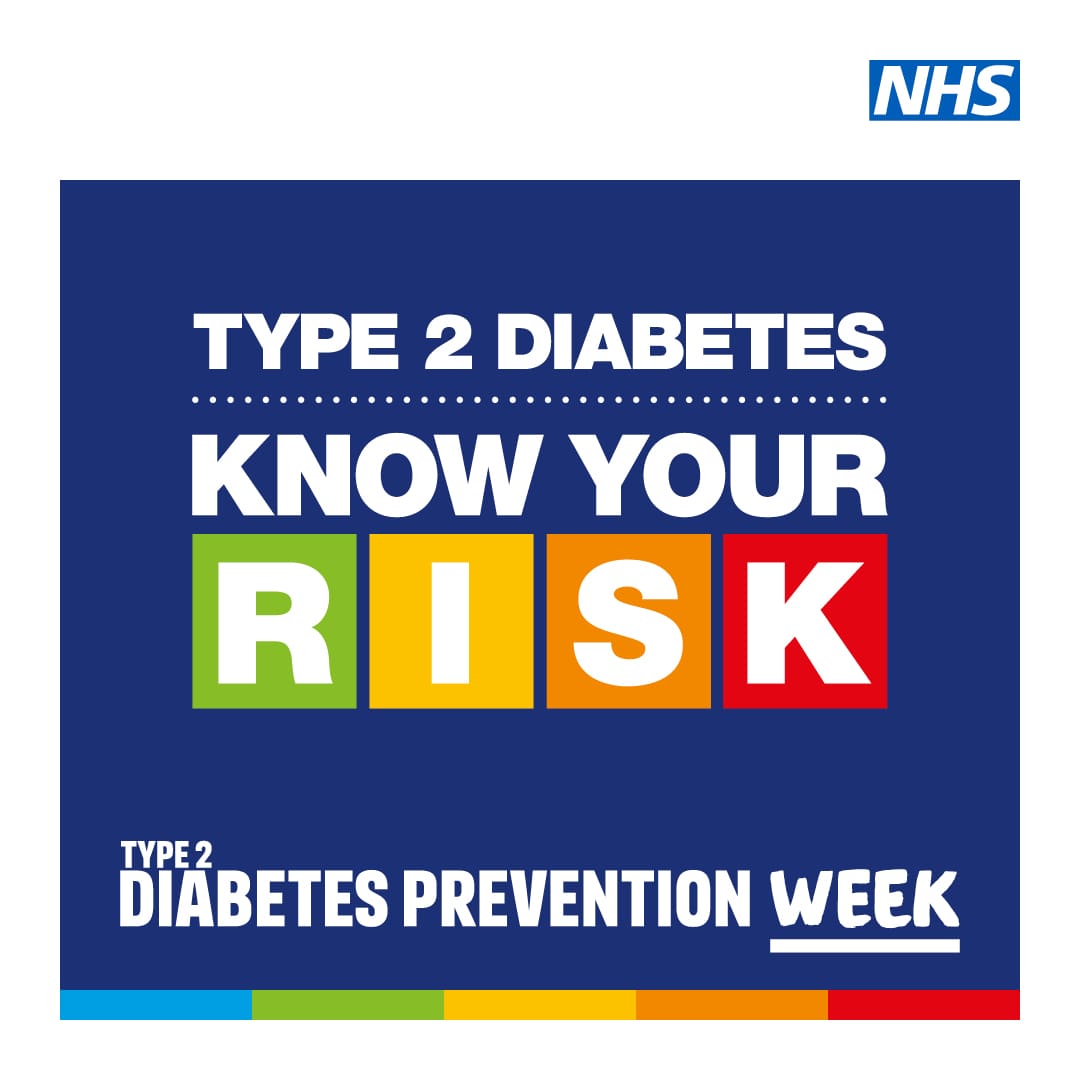This week is Type 2 Diabetes Prevention Week. Around 13.6 million people in the UK are at risk of developing type 2 diabetes. It’s a serious condition that can lead to other health problems sometimes called diabetes complications. Unlike type 1 diabetes, type 2 diabetes can sometimes be prevented. Research has shown that for some people, a combination of lifestyle changes can reduce their risk of type 2 diabetes by about 50%. And we’re here to support you to make changes.
Diabetes type 2 is a condition in which blood sugar (glucose) becomes too high.
It can cause excessive thirst, frequent urination, and fatigue. It is common for people to have no symptoms at all.
The condition increases your risk of getting serious eye, foot, heart, and nerve problems.
The condition can affect your everyday life on a long-term basis. It may be necessary for you to change your diet, take medicines, and have regular check-ups.
It is caused by a chemical in the body (hormone) called insulin. People with type 2 diabetes are often overweight or inactive, or have a family history of the disease.
Symptoms
Many people have type 2 diabetes without realising. This is because they may not always notice any symptoms.
Symptoms of type 2 diabetes can include:
- peeing more than usual
- feeling thirsty all the time
- feeling very tired
- losing weight without trying to
- itching around your penis or vagina, or repeatedly getting thrush
- cuts or wounds taking longer to heal
- blurred vision
You’re more at risk of developing type 2 diabetes if you:
- are over 40 years old, or over 25 if you’re from an Asian, Black African or Black Caribbean ethnic background
- have a close relative with diabetes (such as a parent, brother or sister)
- are overweight or living with obesity or are not very physically active
- are from an Asian, Black African or Black Caribbean ethnic background
Getting diagnosed
Type 2 diabetes is often diagnosed following routine blood tests.
However, you should see a GP straight away if you have any symptoms of diabetes or you’re concerned about your risk.
To diagnose type 2 diabetes:
- Your GP will arrange a blood test to check your blood sugar levels.
- If your blood sugar levels are raised, the GP will explain the test results and what will happen next.
- Usually, a repeat test is needed if you do not have any symptoms.
Can it be prevented?
It has been shown in research that changing your lifestyle, including eating healthy, moving more, and losing weight, can help reduce your risk of developing type 2 diabetes by half.
When you’re at risk of type 2 diabetes, losing excess weight, keeping active, and eating healthily may help your body make more insulin or use it better.
The reasons people are at risk can be different and some people are more at risk than others. But research has shown that, for some people, getting support to make changes to your lifestyle, including healthy eating, moving more and losing weight, can help reduce your risk by about 50%.
You can reduce your risk of developing type 2 diabetes by:
- eating well
- moving more
- getting support to lose weight if you need to.
What can be difficult is knowing how to do it – especially long-lasting changes.
Remember, if you enjoy something, you’re more likely to stick to it.
Here are some tips to get you inspired:
- Don’t forget, you’re not alone in this – there’s lots of support out there to help you.
- Set goals which are realistic and work for you.
- Change one thing at a time and make the changes part of your everyday.
If you are diagnosed with diabetes
What the GP will discuss with you during your appointment depends on the diagnosis and the treatment they recommend.
Generally, they’ll talk to you about:
- what diabetes is
- what high blood sugar means for your health
- setting your target for blood sugar levels
- the regular checks you’ll need to keep you well
- how to get more information about type 2 diabetes
- whether you need to take medicine
- your diet and exercise
- your lifestyle, for example alcohol and smoking.
Get support
Make the most of all the support and services available in your area. Ask your GP about:
- a weight-loss programme or group – there are Prevention Programmes available in England
- a registered dietitian or exercise specialist
- a type 2 diabetes prevention programme
- other local services to help you move more and eat better.
It can also be helpful to talk to family and friends – ask them to get involved as well. When they understand why you’re doing what you’re doing, it will help. Furthermore, moving more and eating better are good for everyone, so you can do this together.
We hope this information helps and gives you lots of advice if you ever faced any of these situations.
If you would like to speak to us about how we could help with your First Aid training requirements, please call us on 01276 586943 or email us at admin@crosscountiestraining.co.uk for hassle-free bookings.
